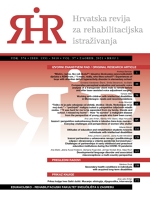Working with children with intellectual disabilities in Montenegro: needs and recommendations
Working with children with intellectual disabilities in Montenegro: needs and recommendations
Author(s): Tamara MilićSubject(s): School education, State/Government and Education, Inclusive Education / Inclusion, Pedagogy
Published by: Sveučilište u Zagrebu, Edukacijsko-rehabilitacijski fakultet
Keywords: inclusive education; children; intellectual disabilities; adaptation;
Summary/Abstract: The aim of this study was to examine and improve the support provided to children with intellectual disabilities in Montenegro. We conducted a qualitative examination to a) determine existing practices, b) analyse the needs of teaching staff and children with intellectual disabilities, c) examine the knowledge and skills required by teachers to support these children, and d) propose relevant recommendations to improve the support provided to these children. The findings of the focus groups indicate that the greatest challenge faced by teachers during the process of teaching is the Montenegrin language and foreign languages in relation to the additional engagement required in the preparation and adaptation of didactic material. Areas of work that have been recognized as crucial for the education of pupils are socialisation, graphomotor skills, and literacy. For the effective planning and realization of teaching, teachers prefer to have a description of the child, the way in which the child works and learns, the child’s interests, needs, and possibilities for learning, as well as their ability to interact socially and maintain relationships with peers. The recommendations are as follows: instead of tagging a child based on the coefficient of intelligence, a functional description of a child should be used; the teaching process and the environment can be adapted based on the child’s needs; a list of situations and characteristics of the process with instructions or ideas for action can be defined; and individualized teaching and didactic material can be developed. The implementation of these recommendations should be monitored through coaching. The topics of training that the teachers believe are useful for professional development and efficient work are developing the educational characteristics and needs of these children, designing and using special teaching and didactic materials, applying assistive technology, mastering basic skills, cooperating with parents, and coaching.
Journal: Hrvatska revija za rehabilitacijska istrazivanja
- Issue Year: 57/2021
- Issue No: 1
- Page Range: 56-65
- Page Count: 10
- Language: English

